The NHL recently opened their doors for Phase 2 of their three-part season restart plan, and the 24-team playoff format was given a start date of July 30. With players returning to the ice and training camps beginning soon, it’ll be time for teams to start fleshing out rosters for gameplay.
Related: Penguins’ Best & Worst Trades of the Decade
The Pittsburgh Penguins are set to begin as the Eastern Conference’s five seed, and will face off against the Montreal Canadiens in the best of five play-in round. With multiple key pieces expected to return to the Penguins lineup, many questions are beginning to arise about where exactly they will be playing.
The following will be a prediction of what the Penguins’ roster will look like come game time. From starting lineups to a chunk of the black aces, this combination should give the black and gold the best chance to win their sixth Stanley Cup.
Forward Line One
Jason Zucker – Sidney Crosby – Conor Sheary
Before the season came to a halt, Sidney Crosby and Jason Zucker were in the midst of finding a great rhythm as each other’s linemates, and there is little to no reason to break them up going forward. After joining the Penguins and spending time on Crosby’s wing, Zucker picked up six goals and six assists in 15 games. He managed to collect two game-winning-goals in that time, as well.

Conor Sheary fills out the first right-wing slot, in part due to the injury of Dominik Simon that has taken him out of action for the next six months, but mostly because that’s where Sheary was spotted during the Penguins’ Stanley Cup victories in 2016 and 2017. During those two regular seasons, Sheary put up stellar numbers; 63 points in his first two seasons in the NHL and 17 playoff points.
Forward Line Two
Jake Guentzel – Evgeni Malkin – Bryan Rust
A healthy Jake Guentzel means a lot to the Penguins’ offense, and before a shoulder injury shelved him for the remaining games of the regular season, he was proving to be versatile enough to play on a line with either Crosby or Evgeni Malkin. Thanks to the introduction of Zucker, it is more likely that Guentzel will be pushed to a second-line role. And being pushed to the second line shouldn’t be an issue, either.
A majority of Guentzel’s season was spent with Malkin and Bryan Rust on the top forward unit. In the 22 games Guentzel played without Crosby, he scored 12 goals and 17 assists for 29 points.
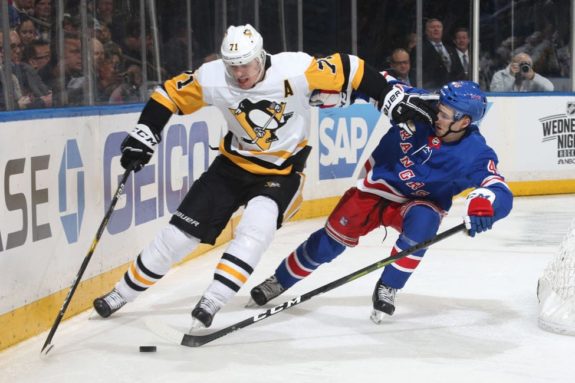
The season Rust and Malkin put together, with or without a consistent third skater, was magical. Malkin wanted to prove he could still be one of the best players in the league, and Rust had his coming-out party, putting up career-high numbers.
Forward Line Three
Patrick Marleau – Jared McCann – Patric Hornqvist
Has anyone else forgotten that Patrick Marleau is a member of the Pittsburgh Penguins? He may have only played eight games with the team but he might have the most drive out of anyone in the locker room. He’s nearing the end of his career and this could be his last chance to win the Stanley Cup.
With Nick Bjugstad being ruled out for the remainder of the year, the popular decision is to put Jared McCann in the third line center spot. He’s had to cover the center spot before when all three of Bjugstad, Malkin, and Crosby were missing due to injury. More than just a scoring touch in the bottom part of the lineup, he took 571 face-offs this season, and won 46.4 percent of them.
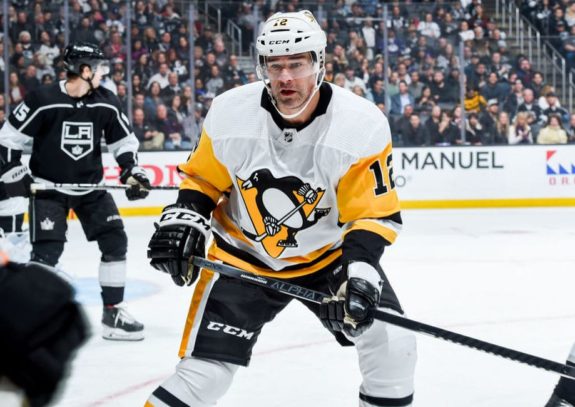
As Hornqvist’s tenure with the Penguins continues, we continue to see him be tossed all over the lineup. There were times he was Crosby’s best wingman; others he would be the net-front spot on the first power-play unit. Now, with the stacking of the lines, he falls to the third line, which is a perfect spot for his style of play. More tenacity and less finesse, he is a workhorse who can open lanes for a speedy McCann and create space for the veteran Marleau.
Forward Line Four
Zach Aston-Reese – Teddy Blueger – Brandon Tanev
Touted as possibly one of the best fourth lines in the league, this trio will no doubt rejoin forces as a healthy Zach Aston-Reese is ready to return along with the season. Aston-Reese may not be superstar across the league, but his role on the Penguins is vital. Being one of the best shut-down forwards and putting up defenseman like numbers.
Brandon Tanev has turned into a spark plug for this team, leading the club in hits (244) and topping all forwards in blocked shots (65). He is not afraid to sacrifice his body in any way for the better of the team. His game is more than just physical play, he is fast enough to keep up with some of the best skaters in the league and has a sneaky ability to score important goals. Of his 11 goal total from this season, four of them were game-winners.
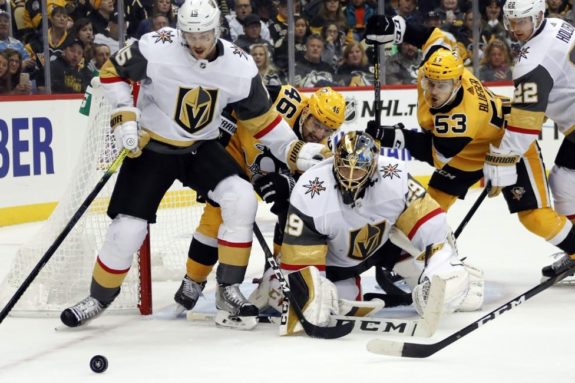
Teddy Blueger was the only forward to play in every single game this season, which says a lot for the fourth line center. His spot was never taken by a minor league call up, and he played well enough to not be given a healthy scratch. And his spectacular season wasn’t based on numbers rather than his hand on the shutdown line.
Defensive Pairs
Kris Letang – Brian Dumoulin
John Marino – Marcus Pettersson
Jack Johnson – Justin Schultz
This is how the defensive lineup read when the season was shut down and there is no need to change it. Kris Letang and Brian Dumoulin feed off of each other’s play so well, they are one of the more perfect defensive duos in hockey. Letang is able to use his offensive touch while Dumoulin can be the stay-at-home defenseman to shutdown opposing breakouts.
Related: Penguins’ Name & Mascots Hold Legacy in Pittsburgh
This second pairing is one of the youngest you’ll find in the NHL. John Marino and Marcus Pettersson, both with May birthdays, only recently became 23 and 24, respectively. Marino was one of the biggest surprises for the Penguins this season. He is for sure the easy choice for Penguins’ rookie of the year and was able to play wherever you put him. From the first to the third pairings, he knew his role and excelled in it. As for Pettersson, he is the other iron man this year as only he and Blueger played in every game.
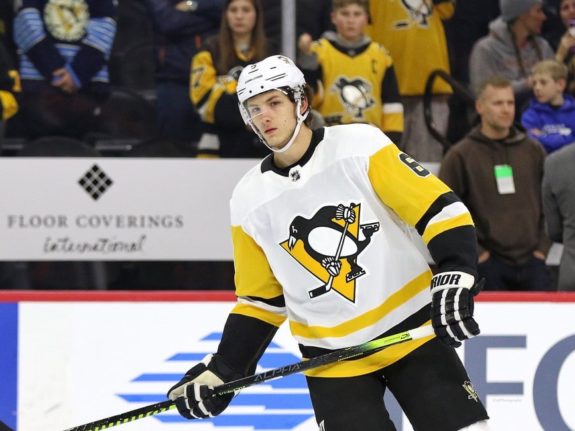
Crawling in at the third-pair position is Jack Johnson and Justin Schultz, two guys that have had better seasons in their careers, to say the least. Schultz, known around Pittsburgh for his scoring touch, was almost completely unable to find the back of the net this year, with only three goals and nine assists. Johnson, however, played a lot of the season filling in for Dumoulin on the first pairing and came out with some inflated minutes. Reducing his role is good for Johnson, he isn’t an offensive threat but did lead the team in blocks.
Starting Goalies
Matt Murray
Tristan Jarry
As we inch closer to a season restart, the question of who will be the Penguins netminder is becoming more and more clear. The edge seems to be leaning in Matt Murray’s direction. It makes sense – he has playoff experience and might be his last chance to show the organization what he is capable of. Whether it be in Pittsburgh or with another team, Murray is due for a new contract and he wants to earn every dime he can.
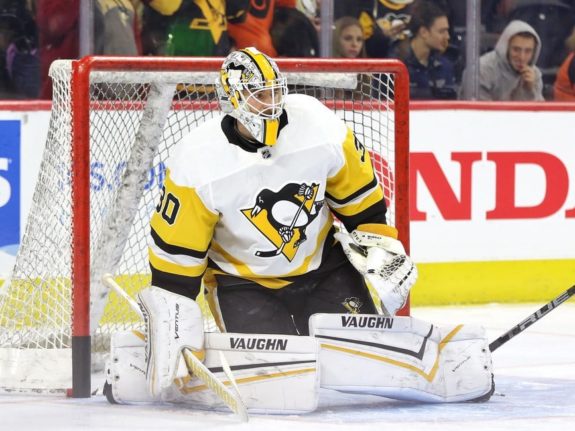
As for Tristan Jarry, he will be there as a stout backup in case of injury or if the wheels fall off for Murray. Everyone is well aware of the ability Jarry possesses and how he is able to win games, but for the time being, sticking with the old guard is the better option.
Even past Jarry, in the worst-case scenario, there’s Casey DeSmith as a third-string goalie who’s ready to redeem himself in an NHL role. He was part of the first group of Penguins to retake the ice at the beginning of Phase 1, and is hungry to gain an NHL spot again.
Scratches
Casey DeSmith, Sam Lafferty, Juuso Riikola, Chad Ruwhedel
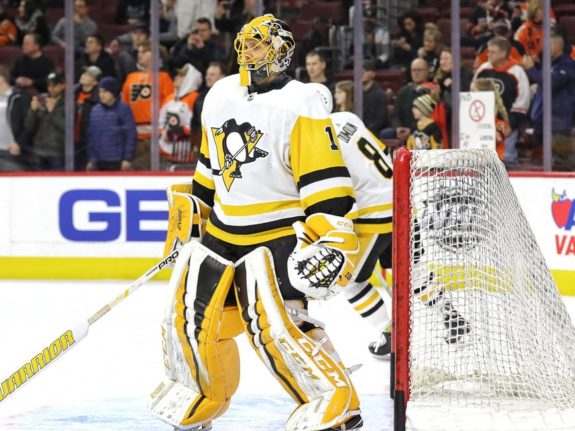
The guys that have seen a fair share of ice time this season with the long list of injuries, with an exception for DeSmith. All of these guys have what it takes to be NHL regulars, but the current starting lineup in Pittsburgh is stacked enough that they will be the first ones to suit up in case of injury or poor play.
Black Aces/Extras
Emil Larmii, Samuel Poulin, Nathan Legare, Pierre-Olivier Joseph, Anthony Angel, Zach Trotman
Things can get very interesting when discussing who will fill in the expanded roster spots. Does the team want to call up the slim group who have NHL experience? Or do they dig into the well and bring in youngsters who are in the midst of development? Granted it is a long shot these players see any real playing time, but given the way injuries have gone for the Penguins this year, you shouldn’t completely rule them out.
Related: Penguins’ Franchise Stars – Malkin Is Better Than Jagr
The smartest move might be to bring up the youngsters that are probable to see consistent professional time in the near future. Even if it is a long shot that they get into games, being able to practice and be around the team can plant the seed of great chemistry for when their time comes.
Having young prospects along with a healthy mix of call ups that have previously seen NHL time should be a recipe for success, even if it would take great failure to have them reach the ice. As a team, the top priority is to win games by putting the best team possible on ice. Youngsters like Samuel Poulin and Nathan Legare had standout preseason NHL games and even better seasons in the QMJHL.
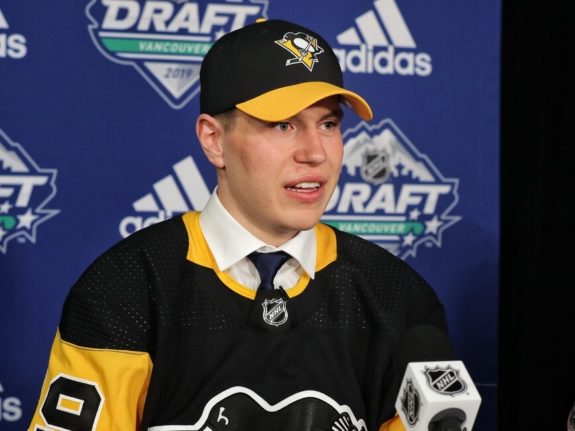
Pierre-Olivier Joseph has received praise throughout the organization since coming over in the Phil Kessel trade. After spending the entire 2019-20 season with the AHL Wilkes-Barre/Scranton Penguins, many say he should be ready for the NHL as early as next season.
The Penguins are going into the 24-team playoff format with one of the deepest selections of players in the league. There is value to be had at every position and a wealth of depth to back it all up.